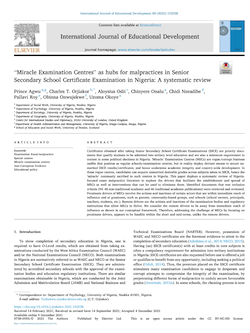
Publication Type: Journal Article
Countries: Nigeria
Authors: Prince Agwu, Charles Orjiakor, Aloysius Odii, Chinyere Onalu, Chidi Nzeadibe, Pallavi Roy, Obinna Onwujekwe, Uzoma Okoye
Publication date: January 2022
Keywords: Education
Highlights
- Certificates obtained from writing Senior Secondary Certificate Examinations (SSCEs) are priority documents in Nigeria.
- The pressure to obtain these certificates have given rise to endemic exam malpractice.
- Rogue schools popularly known as miracle examination centres (MECs) position to make profit by ‘helping’ candidates cheat.
- We conducted a systematic review to understand the nature of MECs, the drivers, as well as proposed solutions to the problem.
Certificates obtained after taking Senior Secondary School Certificate Examinations (SSCE) are priority documents that qualify students to be admitted into tertiary level education and are also a minimum requirement to contest in some political elections in Nigeria. ‘Miracle’ Examination Centres (MECs) are rogue/corrupt business outfits that position as regular schools/examination centres, but in reality deploy deviant means to secure unmerited SSCE results/certificates, and hence undermine academic integrity and country-wide development. In these rogue centres, candidates can acquire unmerited desirable grades across subjects taken in SSCE, hence the ‘miracle’ commonly ascribed to such centres in Nigeria. This paper deploys a systematic review of Nigeria-focused exam malpractice literature to explore the drivers that facilitate the establishment and spread of MECs as well as interventions that can be used to eliminate them. Identified documents that met inclusion criteria (94: 48 non-traditional academic and 46 traditional academic publications) were retrieved and reviewed. Proximate drivers of MECs involve the actions and inactions of certain actors that are within immediate reach of influence and at grassroots, such as parents, community-based groups, and schools (school owners, principals, teachers, students, etc.). Remote drivers are the actions and inactions of the examination bodies and regulatory institutions that allow MECs to thrive. We consider the remote drivers to be away from immediate reach of influence as shown in our conceptual framework. Therefore, addressing the challenge of MECs by focusing on proximate drivers, appears to be feasible within the short and mid-terms, unlike the remote drivers.
You can read the article on the International Journal of Educational Development

